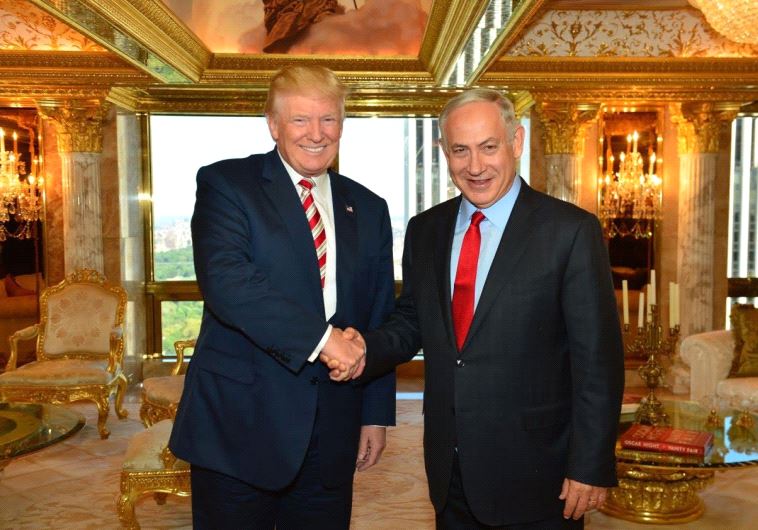On Wednesday, Donald Trump held a press conference at the White House together with Israeli Prime Minister Benjamin Netanyahu. Trump was “looking at two-state and one-state” formulations. The previous three US presidents had all called for the formation of a Palestinian state. Yet over almost three decades, it became clear that this plan was not going anywhere.
On December 28 of last year, then US Secretary of State John Kerry gave a speech in Washington declaring that the “two-state solution is now in serious jeopardy.” This plan had been favored not only by the US, but also by most other imperialist powers for decades. Commentators around the world interpreted Kerry’s remarks to mean this idea is now “a fantasy” or simply “dead”.
A historical idea
There is increasing discussion about alternatives. When Trump and Netanyahu talk about “one state”, they mean Israeli formally annexing the Palestinian territories, leaving the Palestinians with no rights. But “one state” historically has a very different meaning. It refers to the idea of a single, democratic state in historical Palestine in which all people – regardless of ethnicity of religion – can live with equal rights. A few decades ago, the idea of a “one-state solution” like this was self-evident, not only for the PLO but also for radical leftists in Israel and around the world. It was only in the 1990s that the “two-state solution” began to gain traction as an alternative.
What is the result of the campaign for two states, i.e. for an independent Palestinian state next to Israel? More than 20 years after the Oslo Accords, the Palestinians have been forced into even deeper misery, while Israeli society has shifted steadily to the right. An end to the occupation of the West Bank, which has been going on for almost 50 years, is nowhere in sight. Quite the opposite: Due to the expansion of Israeli settlements, even the most enthusiastic advocates of the “two-state solution” (namely: diplomats of imperialist states) can’t indicate where a Palestinian state would be founded.
Against this backdrop, the “one-state solution” is regaining popularity. One well-known supporter of this idea is the Israeli historian Ilan Pappé, who was interviewed in the first issue of Left Voice. The former Israeli prime minister Ehud Olmert has gone on record saying that the greatest threat to the state of Israel would be if the Palestinians were to shift away from the demand for their own state towards a “South African-style struggle for equal voting rights”. “One person, one vote” – the founding principle of bourgeois democracy – would mean “the state of Israel is finished”, in Olmert’s words.
This one state already exists. Millions of Palestinians already live under the rule of the Israeli authorities. Should they not enjoy basic democratic rights? Right-wingers call this simple democratic demand “antisemitic”. That is a disgrace. Was MAPAM, the second-largest party in the first Knesset elections in 1948, antisemitic? The Israeli socialist organization Matzpen, who protested against the war in 1967? The General Jewish Worker Bund? And also the Israeli radical left today? All these forces, in different ways, have advocated for a single state for all people in the region.
Marxist critique
But as Marxists, we are critical of this “one-state solution” – we criticize it from the left. We always support democratic demands. But at the same time we ask: What subject can win these demands in struggle?
For Ilan Pappé, the “one-state solution” is more or less a bourgeois reform project. He says that Israelis and Palestinians must continue dialogue with each other more and then it will all work out. . Pappé ignores the fact that the respective elites have arranged themselves perfectly with the brutal conditions – permanent war, occupation and hatred. Not only the ruling class of Israel but also the Palestinian leadership is dependent on the conflict. The corrupt, right-wing governments on either side of the “Green Line” could not survive for 30 seconds without the war.
Profound political changes, such as Pappé proposes, require a political subject. For Marxists, this subject can only be the working class, an expropriated and therefore “universal class” (Marx) which can united all the oppressed in the struggle against capitalism. In the specific context of Israel this means: The Israeli and Palestinian bourgeoisie must be overthrown to establish democratic conditions. In order to create a state with equal rights for all, the proletariat of all countries in the region must constitute itself as an independent political force.
What would “democracy” even mean if the crass social differences between Israelis and Palestinians – and the even crasser differences within these two groups – were to persist? Then we would have a system like today’s South Africa, where the liberation from Apartheid has helped a few black politicians to gain unimaginable wealth, while the masses remain in dire poverty. In Palestine, the construction of a democratic society for all – including the Palestinian refugees – is impossible without heavy encroachment on the right to private property.
Council Republic
Only on a socialist basis can a “one-state solution” become reality. People with bourgeois ideas will object that the hatred amongst people in the region is too widespread for them to ever live together in peace. However, local activists continuously report how reactionary prejudices disappear surprisingly quickly in the course of joint struggles.
Only a workers’ council republic in historic Palestine will bring real equality and lasting peace. But such an attempt cannot be confined to a small country. It will be successful only within the framework of a socialist federation of the Middle East. This is a program of permanent revolution for Palestine. The struggle for national liberation can only be completed by expropriating the bourgeoisie. The struggle for socialism can only be completed by expanding the revolution across national borders.
This text is based partly on an article in German on Klasse Gegen Klasse from April 27, 2015.











